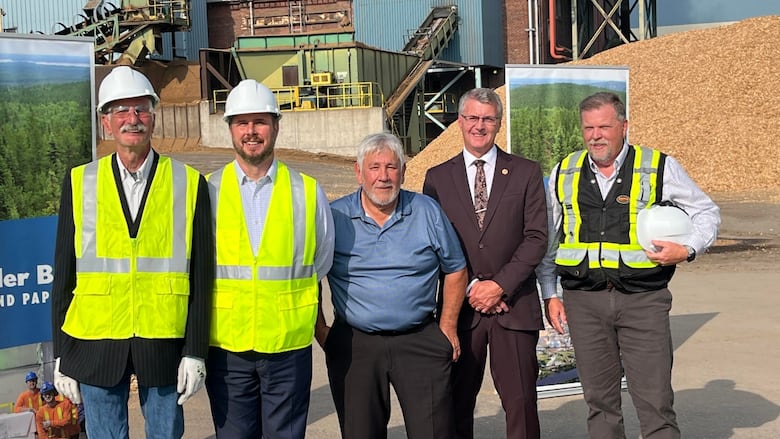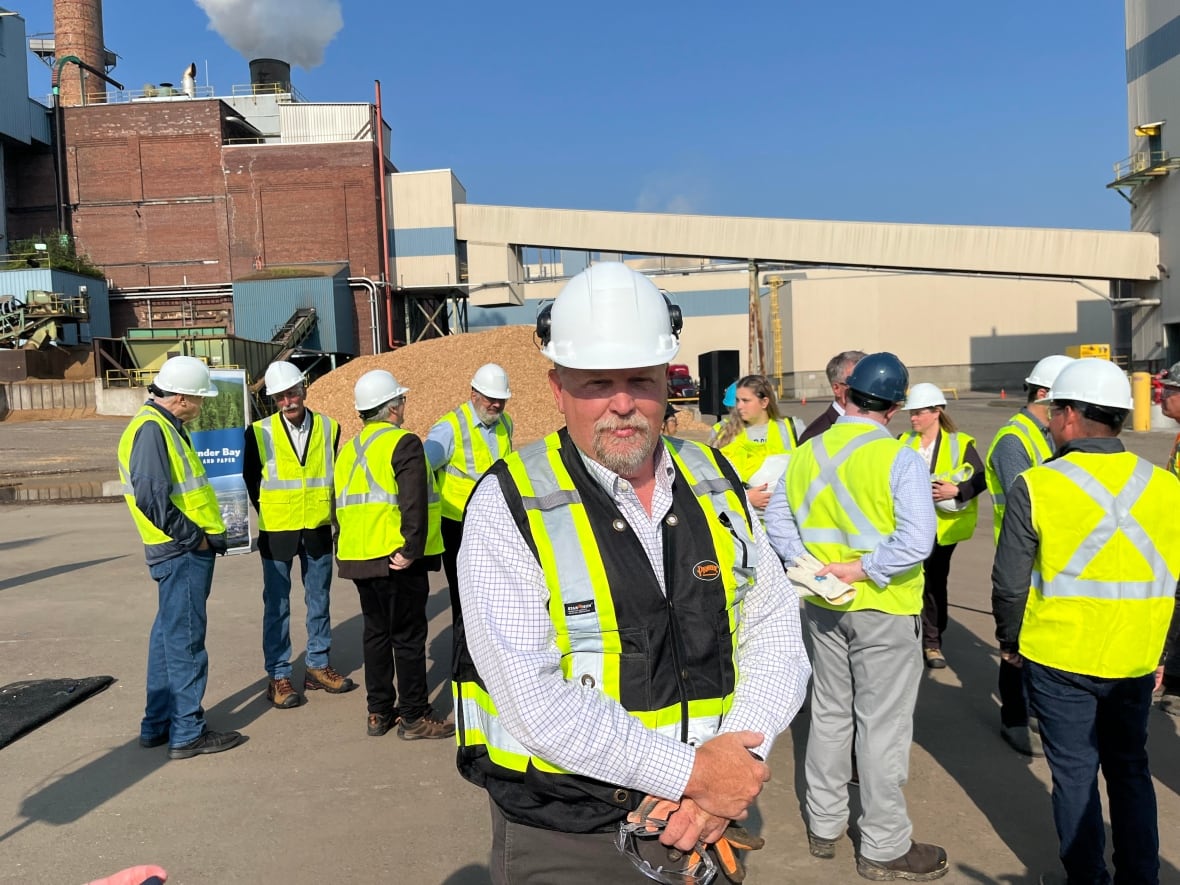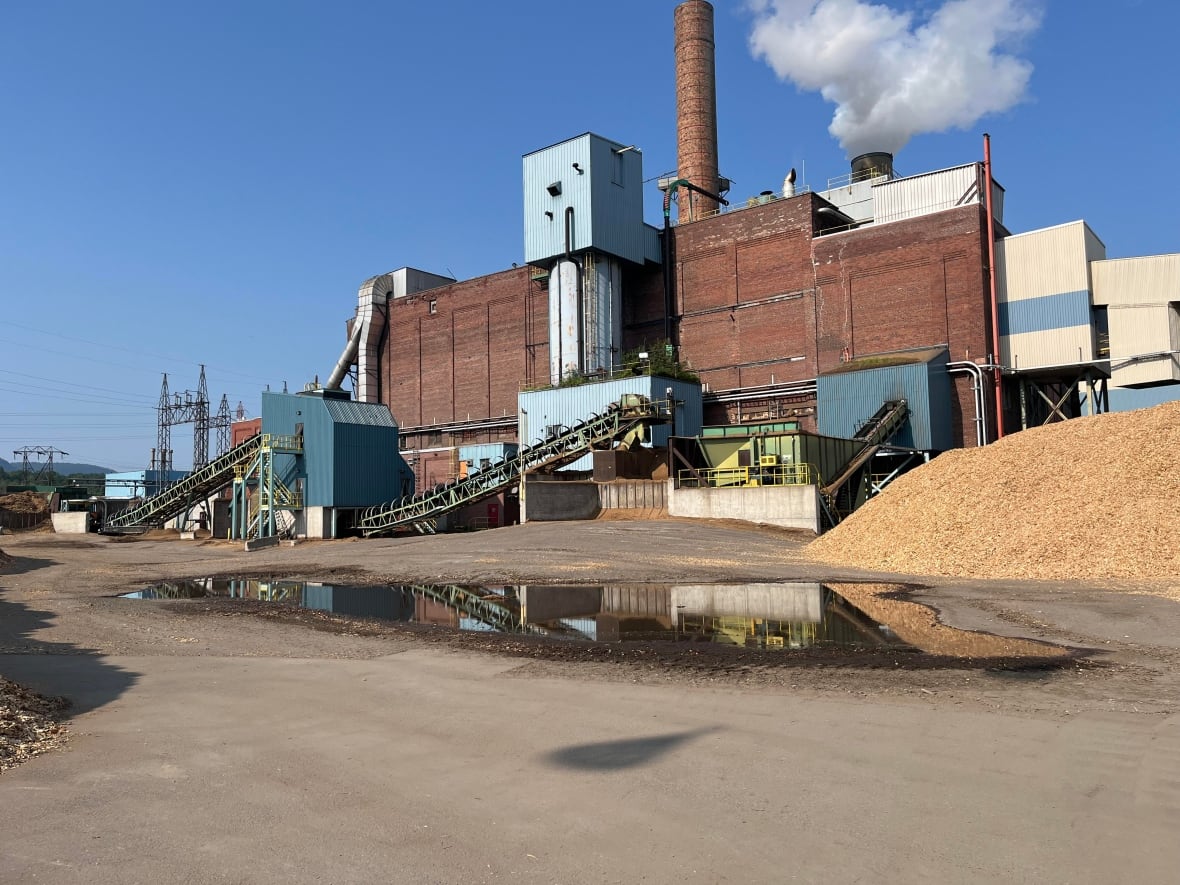Ontario betting big on biomass in northwestern region
$5 million of the funding will go to Thunder Bay's Centre for Research and Innovation in the Bio-Economy

Northwestern Ontario's biomass sector is getting a significant boost from the provincial government, to the tune of $6.2 million. Thunder Bay's Centre for Research and Innovation in the Bio-Economy (CRIBE) will be receiving $5 million of the funding to go toward advancing research and development of forest based products.
The announcement was made on Friday amidst heaps of lumber shavings at the Thunder Bay Pulp and Paper mill. The funding is part of the Ontario government's Forest Biomass Action Plan.
"Our government's forest biomass program is developing this valuable resource through targeted investments, increasing Ontario's use of forest biomass, byproducts and related technologies," said Kevin Holland, MPP for Thunder Bay-Atikokan and the province's associate minister of forestry and forest products.
Biomass development has received increased attention across Canada over the past few years, largely due to its potential as an alternative to non-renewable fossil fuels.
"The technologies and the product development that we support feeds into automotive, chemical, housing, energy and so much more," said Scott Jackson, CRIBE's CEO, at the press conference.
Jackson says the research centre is currently exploring the conversion of woody biomass into liquid fuels.
CRIBE is one of eight projects receiving funding from the province. Thunder Bay's century old Pulp and Paper mill will also be receiving $87,500 towards designing upgrades to its sludge procession, fibre recovery and boiler systems, according to a press release distributed at the announcement.
"We have trace amounts of lime and, you know, useful products that rather than going to a landfill we can reclaim through sludge processing and we can utilize them on farm fields and in other ways," said Bill MacPherson, CEO of Thunder Bay Pulp and Paper. He adds that for any log that is processed for lumber, roughly 15 to 20 percent of it is converted to wood chips that likely will go to the landfill.
"We could turn that into pulp, useful products, along with green energy."
The mill's funding builds on the $5 million dollars it received last year from the province to modernize its electrical system, namely through improving the efficiency of its green power generation infrastructure.
Thunder Bay's current acting mayor Dominic Pasqualino says the forestry sector has long been a cornerstone in northwestern Ontario's regional economy, and any investments in the sector are beneficial to the region as a whole.
Other companies that received funding this year include White River Forest Products in White River and Biopower in Atikokan, Ont. Four Nirst Nations in the region are also receiving funding towards biomass fuel conversion, wood storage and merchandising, and development of forestry practices.
"Through this funding, our community has been able to undertake several critical studies and purchase much needed equipment for a biomass heating project," said Chief Paul Gladu, of Bingwi Neyaashi Anishinaabek, also known as Sand Point First Nation. He says the heat provided from biomass will lower electricity costs for members of his community.

Why biomass?
Biomass includes wood shavings and waste, dead trees and other plant matter that can be used to generate heat, contribute to the making of more sustainable building materials, and even help develop renewable fuels.
Increasingly, provinces and territories have been encouraging the use of biomass as a way to clean up their power grids.
In March, Nova Scotia's government made regulatory changes to Nova Scotia Power, requiring the utility to use 160 gigawatt hours of biomass annually until 2027. Meanwhile, government officials and researchers in the Northwest Territories have been advocating for the use of biomass to help the territory ween off its reliance on diesel.
Not all environmental advocates are on board with the use of biomass as a green alternative. In 2020, research from the Massachusetts Institute of Technology found that the burning of wood contributed as much carbon emission as coal and even more than natural gas.
Biomass as a fuel for the future?
Biomass remains highly sought after in Europe, as researchers look for ways to convert it into reusable fuels for futher automation, and to power vehicles.
"We're seeing European markets that are demanding a certain level of renewable biofuels," Jackson said.

Last year, Irish renewable energy company Simply Blue announced plans for a multi-billion dollar project in Nova Scotia that would look to convert wood chips, alongside solar and wind, into jet fuel. Meanwhile, Canadian renewable fuel manufactuers SustainAgro Ltd. announced plans in 2023 to open a facility in Prince Edward Island to convert biomass into renewable diesel.
After plans fell through in P.E.I., Thunder Bay was floated as a possible location for the site.

